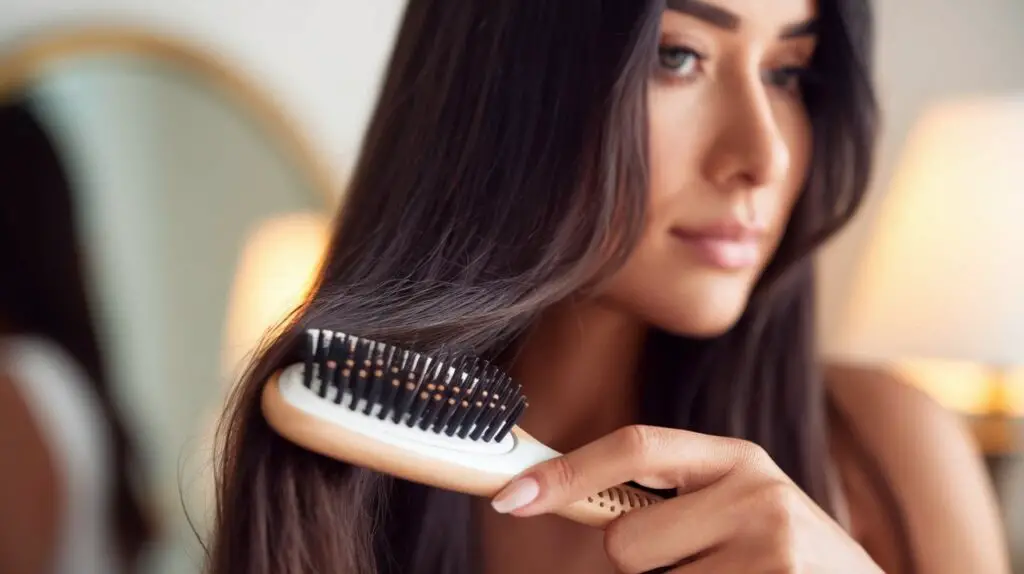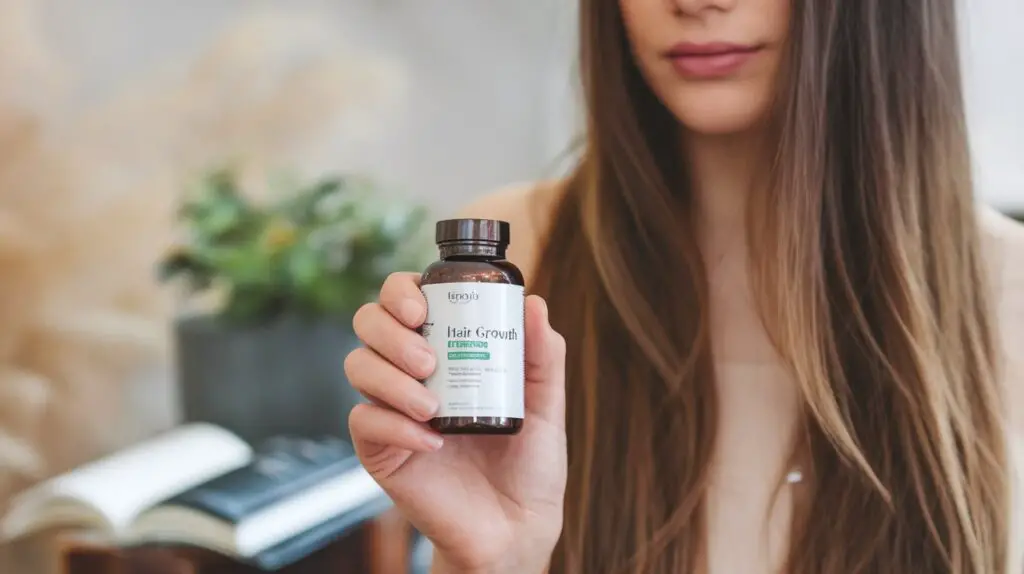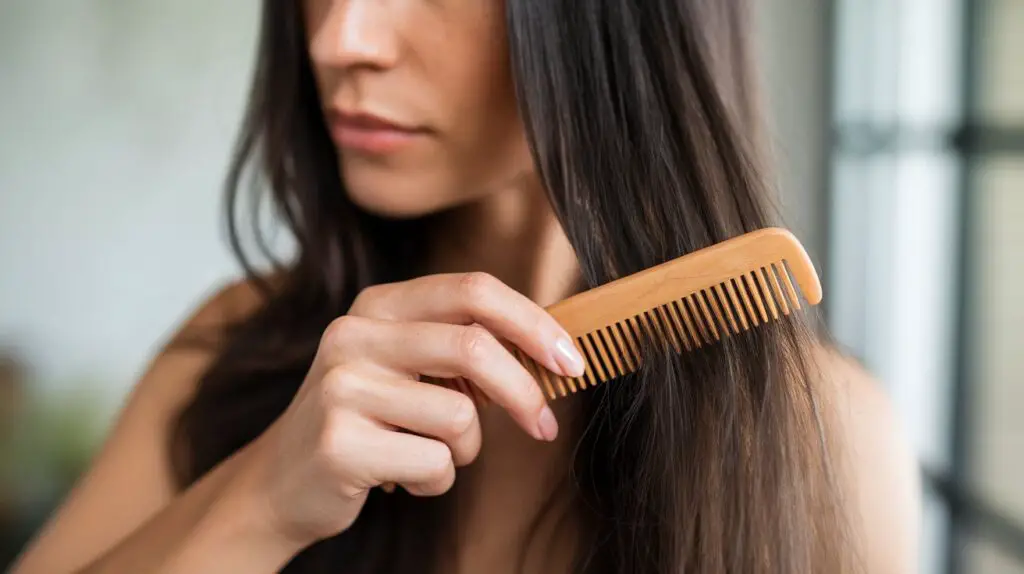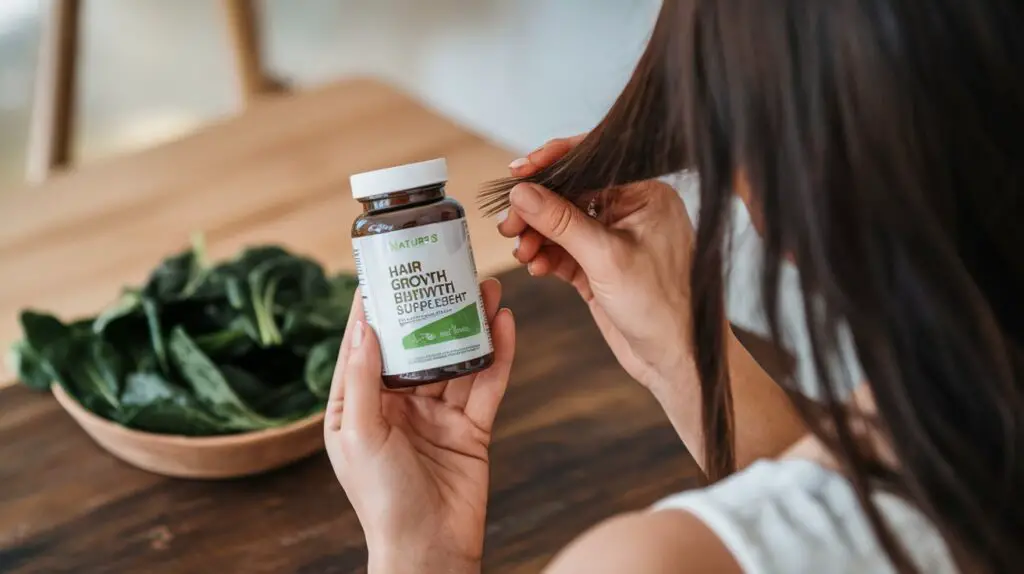Hair growth is a natural process that follows a cycle of growth, rest, and shedding. Many women experience changes in their hair’s thickness and quality over time. These changes can be influenced by various factors, including genetics, hormones, stress, and diet.
Thinning hair is a common concern for women of all ages. It can result from hormonal imbalances, nutritional deficiencies, or medical conditions. Some women notice increased hair shedding during certain life stages, such as after pregnancy or during menopause. Understanding the root causes of hair thinning is crucial for finding effective solutions.
Nutrition plays a vital role in maintaining healthy hair. A balanced diet rich in vitamins, minerals, and proteins provides the building blocks for strong, vibrant hair. Here’s how hair growth supplements can support your hair’s natural potential. We’ll talk about the key ingredients in these supplements, their effectiveness, and how to choose the right one for your needs.
- What Are Hair Growth Supplements?
- Do Hair Growth Supplements Really Work?
- Which Nutrients Are Essential for Hair Growth?
- How to Choose the Right Hair Growth Supplement?
- Are There Any Side Effects of Hair Growth Supplements?
- Nurturing Your Locks: A Holistic Approach to Hair Health
- Frequently Asked Questions
What Are Hair Growth Supplements?

Hair growth supplements are dietary products designed to support and enhance the natural hair growth process. These supplements aim to provide your body with essential nutrients that may be lacking in your regular diet. But what exactly do they contain, and how do they work?
Definition of hair growth supplements
Hair growth supplements are formulated to nourish your hair follicles from within. They typically come in the form of pills, capsules, or gummies that you take daily. These supplements are not magic solutions but rather tools to support your body’s natural hair growth cycle.
Key ingredients in hair growth supplements
The effectiveness of hair growth supplements largely depends on their ingredients. Some common components include:
- Biotin: A B-vitamin that helps produce keratin, the protein that makes up hair
- Iron: Essential for carrying oxygen to hair follicles
- Vitamin D: Helps create new hair follicles
- Zinc: Aids in protein synthesis and cell division
- Omega-3 fatty acids: Support scalp health
How hair growth supplements work
Hair growth supplements work by providing your body with the nutrients it needs to produce healthy hair. They don’t directly cause hair to grow but rather create an optimal environment for hair growth.
These supplements can help address nutritional deficiencies that might be hindering your hair growth. For example, if you’re low on iron, your hair follicles may not receive enough oxygen, leading to slower growth or even hair loss. By supplementing with iron, you can potentially improve this situation.
Types of hair growth supplements
You’ll find various types of hair growth supplements on the market. Some focus on a single ingredient, like biotin, while others offer a blend of vitamins and minerals. There are also supplements that include herbal extracts believed to promote hair growth, such as saw palmetto or horsetail extract.
Choosing the right type depends on your specific needs. If you know you’re deficient in a particular nutrient, a targeted supplement might be best. However, if you’re looking for overall hair health support, a multivitamin formulated for hair growth could be more suitable.
Potential benefits for hair health
While results can vary from person to person, hair growth supplements may offer several potential benefits:
- Stronger hair: Nutrients like biotin and zinc can help strengthen hair strands.
- Faster growth: Some users report quicker hair growth with consistent use.
- Reduced shedding: Certain ingredients may help reduce excessive hair shedding.
- Improved scalp health: Omega-3s and other nutrients can support a healthy scalp.
- Increased hair density: Over time, some women notice thicker-looking hair.
It’s important to note that hair growth supplements are not a quick fix. They typically require consistent use over several months before you might see noticeable results. Also, they work best when combined with a balanced diet and proper hair care routine.
Remember, while hair growth supplements can be helpful, they’re not a substitute for professional medical advice. If you’re experiencing significant hair loss or thinning, it’s always best to consult with a healthcare provider to rule out any underlying health issues.
Do Hair Growth Supplements Really Work?

The question of whether hair growth supplements actually work is a common one among women looking to improve their hair health. While many users report positive results, it’s important to understand the science behind these products and set realistic expectations.
Scientific evidence supporting hair supplements
Research on hair growth supplements shows mixed results. Some studies have found positive effects, particularly for individuals with specific nutrient deficiencies. For example, a study published in the Journal of Clinical and Aesthetic Dermatology found that women with thinning hair who took a specific supplement experienced increased hair growth and thickness after 90 days.
However, it’s crucial to note that not all supplements are created equal. The effectiveness often depends on the specific ingredients and their quality. Some ingredients, like biotin and iron, have more scientific backing than others.
Factors influencing supplement effectiveness
Several factors can impact how well hair growth supplements work for you:
- Your current nutritional status
- Overall health and any underlying conditions
- Genetics
- Age
- Stress levels
- Hair care practices
If you’re already getting enough nutrients from your diet, you might not see dramatic results from supplements. On the other hand, if you have deficiencies, supplements could make a noticeable difference.
Realistic expectations for results
What should you expect when taking hair growth supplements? It’s important to have realistic goals. These products aren’t miracle cures that will suddenly give you a full head of thick, long hair overnight.
Instead, you might notice subtle improvements over time. Your hair might feel stronger, look shinier, or shed less. Some women report that their hair grows faster or that they see new growth in areas that were thinning.
Remember, everyone’s hair is different. What works wonders for your friend might not have the same effect on you. It’s all about finding what works best for your individual needs.
Timeframe for visible improvements
Patience is key when it comes to hair growth supplements. Your hair grows about half an inch per month on average, so it takes time to see noticeable changes.
Most experts suggest giving supplements at least three to six months before evaluating their effectiveness. During this time, be consistent with your supplement regimen and maintain a healthy lifestyle for the best results.
You might start noticing some changes earlier, such as less shedding or improved texture, but significant growth or thickness improvements usually take longer to become apparent.
Limitations of hair growth supplements
While supplements can be helpful, they do have limitations. Here are some important points to consider:
- They can’t reverse genetic hair loss.
- They’re not a substitute for a balanced diet.
- Results may vary greatly from person to person.
- They might not address underlying health issues causing hair problems.
- Some people may experience side effects.
It’s also worth noting that the FDA doesn’t regulate supplements as strictly as medications. This means the quality and effectiveness can vary widely between brands.
If you’re experiencing severe hair loss or thinning, it’s best to consult with a healthcare provider. They can help identify any underlying causes and recommend the most appropriate treatment, which may or may not include supplements.
In the end, hair growth supplements can be a helpful tool in your hair care routine, but they’re not a magic solution. Combining them with a healthy diet, proper hair care, and stress management often yields the best results. If you decide to try supplements, choose high-quality products and give them time to work. And always listen to your body – if something doesn’t feel right, don’t hesitate to seek professional advice.
Which Nutrients Are Essential for Hair Growth?

Healthy hair growth depends on a variety of nutrients. Your body needs these essential building blocks to produce strong, vibrant hair. Let’s explore some key nutrients that play a crucial role in maintaining and promoting hair health.
Biotin and its impact on hair
Biotin, also known as vitamin B7, is often touted as a hair growth superstar. But what does it actually do? This water-soluble vitamin helps your body convert food into energy and plays a vital role in the health of your hair, skin, and nails.
How does biotin support hair growth? It’s involved in the production of keratin, the protein that makes up your hair strands. Some studies suggest that biotin supplements may help strengthen hair and reduce breakage, especially in people with biotin deficiency.
You can find biotin in foods like eggs, nuts, seeds, and sweet potatoes. However, if you’re considering a biotin supplement, talk to your doctor first. While it’s generally considered safe, excessive biotin intake can interfere with certain lab tests.
The importance of iron for hair health
Iron deficiency is one of the most common nutritional deficiencies worldwide, particularly among women. But did you know it can also affect your hair?
Iron helps red blood cells carry oxygen to your cells, including those in your hair follicles. Without enough iron, your hair follicles may not get the oxygen they need to function properly. This can lead to hair loss or thinning.
If you suspect you might be iron deficient, don’t start taking iron supplements on your own. Too much iron can be harmful. Instead, consult with a healthcare provider who can test your iron levels and recommend appropriate treatment if needed.
Vitamin D and hair follicle stimulation
Vitamin D isn’t just for strong bones – it also plays a role in hair growth. This vitamin helps create new hair follicles and may activate dormant follicles. Some research suggests that people with hair loss often have lower levels of vitamin D.
Your body can produce vitamin D when your skin is exposed to sunlight. However, many people don’t get enough sun exposure or have trouble absorbing vitamin D. In these cases, supplements or vitamin D-rich foods like fatty fish, egg yolks, and fortified dairy products can help.
Omega-3 fatty acids for scalp health
A healthy scalp is the foundation for healthy hair growth. This is where omega-3 fatty acids come in. These essential fats nourish the hair follicles and support scalp health. They may also help reduce inflammation, which can contribute to hair loss.
Where can you find omega-3s? Fatty fish like salmon, mackerel, and sardines are excellent sources. If you’re not a fan of fish, you can also get omega-3s from plant sources like flaxseeds, chia seeds, and walnuts. Some people choose to take fish oil or algae-based omega-3 supplements.
Zinc’s role in hair tissue growth and repair
Zinc is a mineral that’s involved in many aspects of cellular metabolism. For your hair, zinc plays a crucial role in protein synthesis and cell division – both important for hair growth. It also helps keep the oil glands around your hair follicles working properly.
A zinc deficiency can lead to hair loss, but this is relatively rare in developed countries. Still, certain groups, like vegetarians and people with digestive disorders, may be at higher risk of deficiency. Good food sources of zinc include:
- Oysters
- Beef
- Pumpkin seeds
- Lentils
- Yogurt
While these nutrients are important for hair health, it’s crucial to maintain a balanced diet overall. No single nutrient is a magic solution for hair growth. Instead, focus on eating a variety of nutrient-rich foods to support your overall health, including the health of your hair.
If you’re concerned about hair loss or thinning, it’s always best to consult with a healthcare provider. They can help identify any underlying issues and recommend appropriate treatments, which may include dietary changes or supplements if necessary. Remember, healthy hair starts from within, so nourishing your body with the right nutrients is a key step in achieving the hair you desire.
How to Choose the Right Hair Growth Supplement?

Selecting the right hair growth supplement can feel overwhelming with the myriad of options available. However, by focusing on your specific needs and understanding what to look for, you can make an informed decision.
Assessing your individual hair needs
Start by taking a close look at your hair. Are you experiencing thinning, breakage, or slow growth? Each issue might require different nutritional support. For instance, if you’re dealing with brittle hair, a supplement rich in biotin and vitamins A and C might be beneficial. On the other hand, if you’re noticing hair loss, you might want to focus on iron and vitamin D.
Consider your diet as well. Do you follow a vegetarian or vegan diet? If so, you might need supplements that provide nutrients commonly found in animal products, like vitamin B12 or iron.
Your overall health and any existing medical conditions also play a role in determining which supplements might be most helpful. For example, women with polycystic ovary syndrome (PCOS) often experience hair thinning and might benefit from supplements that support hormone balance.
Reading and understanding supplement labels
Once you’ve identified your needs, it’s time to scrutinize supplement labels. But what should you look for? Here are some key points to consider:
- Active ingredients: Check if the supplement contains the nutrients you’re targeting.
- Dosage: Make sure the amounts are appropriate and safe.
- Form of nutrients: Some forms are more easily absorbed by the body than others.
- Additional ingredients: Look out for unnecessary fillers or potential allergens.
Don’t be swayed by marketing claims on the front of the package. The real information is in the Supplement Facts panel on the back. This panel lists all ingredients and their amounts per serving.
Considering potential interactions with medications
An often overlooked aspect of choosing supplements is their potential interaction with medications you might be taking. Some supplements can interfere with the effectiveness of certain drugs or cause adverse reactions when combined.
For instance, biotin supplements can interfere with lab test results, including those for thyroid function. Iron supplements might reduce the absorption of certain antibiotics. That’s why it’s crucial to discuss any supplements you’re considering with your healthcare provider, especially if you’re on any medications.
Importance of quality and third-party testing
Not all supplements are created equal. The quality of ingredients and manufacturing processes can vary widely between brands. How can you ensure you’re getting a high-quality product?
Look for supplements that have been third-party tested. These independent organizations verify that the product contains what it claims on the label and is free from harmful contaminants. Some well-known third-party testing organizations include USP, NSF International, and ConsumerLab.com.
Additionally, check if the supplement is manufactured in facilities that follow Good Manufacturing Practices (GMP). This certification indicates that the product is produced according to quality standards.
Consulting with a healthcare professional
While it’s tempting to self-diagnose and self-treat, consulting with a healthcare professional can provide valuable insights. They can help identify any underlying health issues that might be affecting your hair and recommend appropriate supplements based on your individual needs and medical history.
A healthcare provider can also order blood tests to check for any nutrient deficiencies. This information can guide you towards the most beneficial supplements for your body.
Remember, what works for one person might not work for another. Your friend’s favorite hair growth supplement might not be the best choice for you. By taking the time to assess your needs, understand labels, consider potential interactions, prioritize quality, and seek professional advice, you’re more likely to find a supplement that supports your hair health goals effectively.
Lastly, keep in mind that supplements are just one piece of the puzzle. A balanced diet, proper hair care, stress management, and overall health all contribute to healthy hair growth. Supplements can support these efforts, but they’re not a magic solution. Be patient, consistent, and realistic in your expectations as you embark on your hair health journey.
Are There Any Side Effects of Hair Growth Supplements?
While hair growth supplements can offer potential benefits, it’s crucial to be aware of possible side effects. Understanding these effects can help you make informed decisions about your hair care routine and overall health.
Common side effects to be aware of
Most hair growth supplements are generally well-tolerated, but some users may experience mild side effects. These can vary depending on the specific ingredients and individual factors. Some common side effects include:
- Digestive issues: Nausea, stomach discomfort, or changes in bowel movements
- Headaches: Particularly when starting a new supplement regimen
- Skin reactions: Acne or rashes in some cases
- Changes in hair texture: Some users report their hair feeling different
It’s important to note that these side effects are typically mild and often subside as your body adjusts to the supplement. However, if you experience persistent or severe symptoms, it’s best to discontinue use and consult a healthcare professional.
Risks of excessive vitamin and mineral intake
Can you have too much of a good thing? When it comes to vitamins and minerals, the answer is yes. Excessive intake of certain nutrients can lead to adverse effects.
For example, too much biotin (vitamin B7) might cause skin rashes, digestive upset, or problems with insulin release. Overconsumption of iron can lead to constipation, nausea, and in severe cases, iron toxicity.
Vitamin A is another nutrient to watch. While essential for hair health, excessive amounts can paradoxically lead to hair loss, as well as other health issues.
The key is to stick to recommended dosages and avoid taking multiple supplements that contain the same nutrients unless advised by a healthcare provider.
Potential allergic reactions to ingredients
Hair growth supplements often contain a mix of vitamins, minerals, and sometimes herbal extracts. While rare, allergic reactions to these ingredients can occur.
Signs of an allergic reaction may include:
- Itching or swelling of the face, tongue, or throat
- Difficulty breathing
- Severe rash or hives
- Dizziness or fainting
If you experience any of these symptoms after taking a supplement, stop using it immediately and seek medical attention. It’s always a good idea to carefully read the ingredient list and avoid products containing substances you know you’re allergic to.
Impact on existing medical conditions
Hair growth supplements can interact with certain medical conditions and medications. For instance, biotin supplements can interfere with lab test results, potentially leading to misdiagnosis of conditions like thyroid disorders.
If you have a pre-existing medical condition, it’s crucial to consult with your healthcare provider before starting any new supplement regimen. This is particularly important for conditions such as:
- Diabetes: Some supplements may affect blood sugar levels
- Autoimmune disorders: Certain ingredients could potentially trigger flare-ups
- Hormone-sensitive conditions: Some supplements might influence hormone levels
Your doctor can help you weigh the potential benefits against the risks and suggest alternatives if necessary.
When to stop taking hair growth supplements
Knowing when to discontinue hair growth supplements is as important as knowing when to start them. Here are some situations where you should consider stopping:
- If you experience persistent side effects that don’t improve over time.
- If you develop new, unexplained symptoms after starting the supplement.
- If you’re planning to undergo surgery, as some supplements can interfere with blood clotting.
- If you become pregnant or are breastfeeding, unless specifically advised by your healthcare provider.
- If you’ve been taking the supplement for the recommended duration without seeing any benefits.
It’s also worth reassessing your need for supplements periodically. As your diet, lifestyle, or health conditions change, your nutritional needs may shift as well.
Remember, hair growth supplements are not a one-size-fits-all solution. What works well for one person might not be suitable for another. Pay attention to how your body responds and don’t hesitate to seek professional advice if you have concerns.
Lastly, while the desire for healthier, fuller hair is understandable, it shouldn’t come at the cost of your overall health. Always prioritize your general well-being over cosmetic goals. A balanced diet, proper hair care, and a healthy lifestyle often provide the best foundation for hair health.
Nurturing Your Locks: A Holistic Approach to Hair Health
Hair growth supplements can be a valuable tool in your quest for healthier, fuller hair. However, they’re just one piece of the puzzle. A well-rounded approach to hair care involves not only considering supplements but also maintaining a balanced diet, managing stress, and adopting proper hair care practices. By understanding the potential benefits and risks of these supplements, you can make informed decisions that align with your individual needs and health goals.
Remember, your hair is a reflection of your overall health. While the allure of quick fixes can be tempting, true hair health is a journey that requires patience, consistency, and a holistic perspective. Listen to your body, consult with professionals when needed, and celebrate the small improvements along the way. With the right approach, you can support your hair’s natural potential and feel confident in your unique beauty.
Frequently Asked Questions
Q: What are hair growth supplements?
A: Hair growth supplements are dietary products designed to support and enhance natural hair growth by providing essential nutrients that may be lacking in your regular diet.
Q: How long does it take to see results from hair growth supplements?
A: Most experts suggest giving supplements at least three to six months before evaluating their effectiveness.
Q: Can hair growth supplements cause side effects?
A: Yes, some common side effects include digestive issues, headaches, skin reactions, and changes in hair texture.
Q: Are hair growth supplements safe for everyone?
A: No, hair growth supplements may interact with certain medical conditions and medications. It’s important to consult with a healthcare provider before starting any new supplement regimen.
Q: What nutrients are essential for hair growth?
A: Key nutrients for hair growth include biotin, iron, vitamin D, omega-3 fatty acids, and zinc.
Q: How do I choose the right hair growth supplement?
A: Choose a supplement based on your individual hair needs, read and understand supplement labels, consider potential interactions with medications, and look for products that have been third-party tested.
Q: Can taking too many vitamins be harmful?
A: Yes, excessive intake of certain vitamins and minerals can lead to adverse effects. It’s important to stick to recommended dosages.
Q: When should I stop taking hair growth supplements?
A: Consider stopping if you experience persistent side effects, develop new unexplained symptoms, are planning surgery, become pregnant or are breastfeeding, or haven’t seen benefits after the recommended duration of use.

